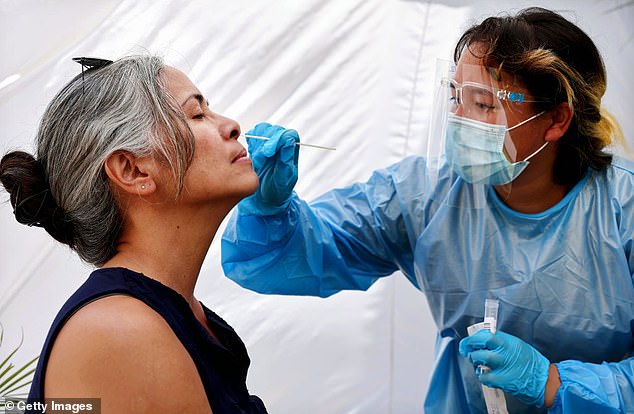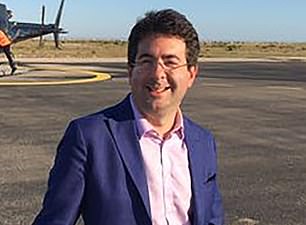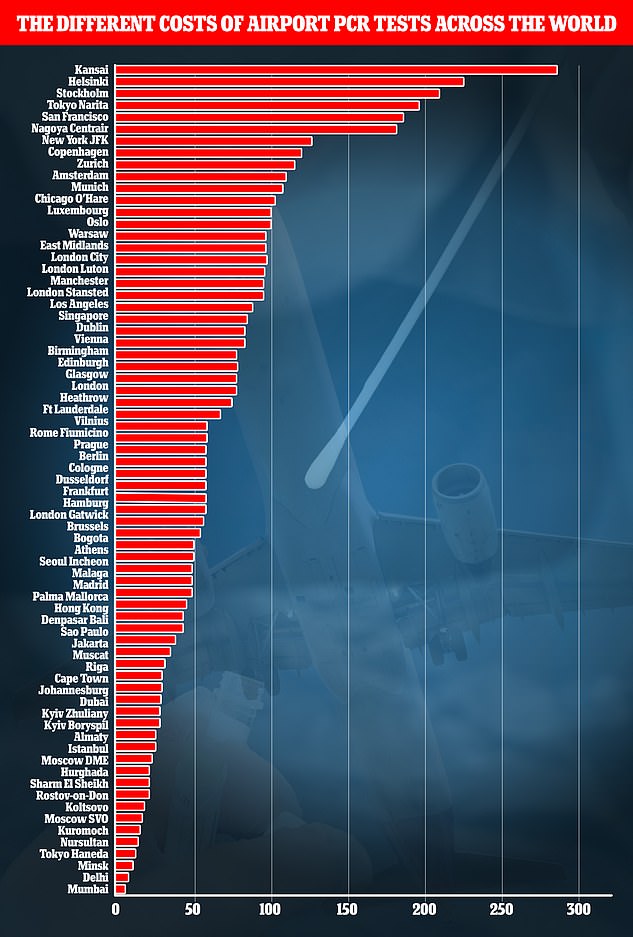Ministers were today accused of trying to ‘dampen demand’ for summer holidays with rip-off Covid PCR tests that can cost up to £400 for holidaymakers.
Health Secretary Sajid Javid asked the Competition and Markets Authority (CMA) to look into companies profiteering on testing.
The watchdog last night revealed it was working on imminent ‘interim’ measures to ensure families can get a well-earned foreign break or reunite with their loved ones abroad.
And it warned it would ‘not hesitate to take enforcement action’ against providers flouting the law and not giving customers what they paid for.
But Paul Charles, chief executive of travel consultancy The PC Agency, today said the CMA’s investigation is ‘too late’.
He claimed there is ‘no doubt’ ministers have been ‘determined’ to purposely bring down demand for travel.
His comments came as London Gatwick airport blamed No10’s travel restrictions for causing its more than £200million losses over the last year. The airport entered talks with banks today to avoid defaulting on its loans built up during the pandemic.

Ministers are trying to ‘dampen demand’ for summer holidays with rip-off Covid PCR tests for holidaymakers, a travel expert has claimed

Paul Charles, chief executive of travel consultancy The PC Agency, says ministers are ‘determined’ to bring down demand for travel
What companies are advertising £20 tests?
Test For Now claims to offer a self-swab Covid test for £21 on the Government website but the cheapest available on its website is for travelers to take on their second day back in the UK and costs £89 for a self-swab version, while it costs £97 for the same test at its clinic.
Meanwhile, Everything Genetic’s £20 offer is only available to NHS staff, with others charged £60.
Pillhub-Feltham Pharmacy and 0-100 Travel 19’s £20 tests are currently sold-out and their other PCR tests cost £80.
ArrivingUK advertising ‘self swab at home’ day two kits for £20 on the Government portal.
But on the firm’s website this was only available to people who could collect them from Wembley in north London. The real cost was £89 plus £10 postage.
Abicare Health was listed at the same low price but its website says this is only available if you can travel to Manchester — and not until November. The real cost for a posted kit is £75.
Advertisement
Mr Charles told BBC Radio 4’s Today programme: ‘This is an industry that has grown up, that’s worth some £700million.
‘It’s grown up in the last six months at great speed, but there’s been a lack of oversight or proper regulation.’
He said the process of organising, paying for and carrying out the tests has ‘too many layers of complexity’.
He added: ‘It’s putting off consumers. Government is determined to dampen demand, I don’t think there’s any doubt about that.
‘But of course, because it’s putting off people, that’s not helping the travel sector recover and we’re likely to see more failures and job losses because ministers have not done enough, along with the regulators, to save the August peak period.’
Some providers offering PCR tests which meet the minimum standards can charge upwards of £200.
The most expensive swabs can cost up to £400.
This week, Conservative MP Henry Smith, chairman of the Future of Aviation All-Party Parliamentary Group, said private Covid tests should be capped at £40.
He said this would allow more people to travel abroad, putting aviation ‘back on a sustainable path to recovery’.
George Lusty, the CMA’s senior director for consumer protection, said: ‘It is essential that people paying for PCR tests are treated fairly, get what they pay for and that their rights are respected when things go wrong.
‘We will not hesitate to take enforcement action if we find evidence that PCR providers are breaching consumer law.
‘We are also working closely with DHSC to get the data we need to identify the cause of any wider problems in the PCR testing market, and to ground our advice on what action may be needed.
‘This is a particularly pressing issue just now for families hoping to enjoy a well-earned holiday after such a difficult year, and for those reuniting with friends and relatives overseas.
‘That is why we are also providing ongoing support to DHSC (Department of Health and Social Care), including on steps that could be considered in the interim, before the rest of our work on the PCR testing market is concluded.’
Although some private providers are advertised on the Government website as offering single-swab packages for £20, the Mail this week revealed how these rates are often not realistically obtainable for many, as when clicking through to each firm’s website they are mostly out of stock.
The £399 PCR test listed on the UK Government’s approved list of providers is offered by the Mayfair GP, a small private practice based in London.
The Department of Health says the tests — which can be performed in a matter of minutes — are carried out by people in their own home. But they are supervised by medical staff, meaning the firm may factor in some travel and labour costs.
The Mayfair GP uses Oncologica’s laboratory to carry out the testing, suggesting the provider likely has to pay to get samples analysed. Labs use a machine and array of chemicals to decipher whether a sample contains Covid.


Research by airline consultancy Skytrax shows airport PCR tests were available for as little as $8 (£5.70) in Mumbai, India, in April. The cost in Britain was nearly £100
Gatwick boss demands Government unlocks travel as airport asks banks for extensions on loans after suffering £200m loss this year
London Gatwick Airport was today in talks with banks to avoid defaulting on its loans as it blamed Government restrictions for pushing it to a £204million loss.
The West Sussex airport said that a year after requesting short-term waivers on its loans, it was again facing pressure and is asking banks for another extension.
And its boss said Ministers had to ‘act now’ and ‘remove unnecessary and costly PCR testing requirements for passengers, particularly for those double vaccinated’.
While the airport has remained open throughout the first six months of the year, it said that a collapse in passenger demand and UK restrictions had hit business hard.
Gatwick’s pre-tax loss hit £204million, about 40 per cent lower than the first six months of 2020 when the Covid pandemic began.
Advertisement
A price in the region of £20 would be reasonable for the swabs, according to a world-renowned expert on PCR at Anglia Ruskin University.
Research by the Tony Blair Institute for Global Change suggests the whole test process can cost as little as £15.
It comes after London Gatwick today began talks with banks to avoid defaulting on its loans.
The West Sussex airport said that a year after requesting short-term waivers on its loans, it was again facing pressure and is asking banks for another extension.
And its boss said ministers had to ‘act now’ and ‘remove unnecessary and costly PCR testing requirements for passengers, particularly for those double vaccinated’.
While the airport has remained open throughout the first six months of the year, it said that a collapse in passenger demand and UK restrictions had hit business hard.
Gatwick’s pre-tax loss hit £204million, about 40 per cent lower than the first six months of 2020 when the Covid pandemic began.
The business was able to save £31.3million by slashing staff costs nearly in half, making more than 40 per cent of its employees redundant last year.
Bosses said it had a ‘strong liquidity position’ and is ‘well placed for recovery due to successful refinancing alongside reduced capital expenditure and operating costs’.
They added that the Government had to ‘take advantage of its world leading vaccination programme to improve passenger confidence in international travel’.
Bosses said the UK aviation recovery is far behind countries in Europe such as France and Germany whose bookings are on average over 50 per cent of pre-Covid levels.
Source link : https://www.dailymail.co.uk/news/article-9890265/Watchdog-looking-immediate-actions-taken-costly-travel-tests.html











